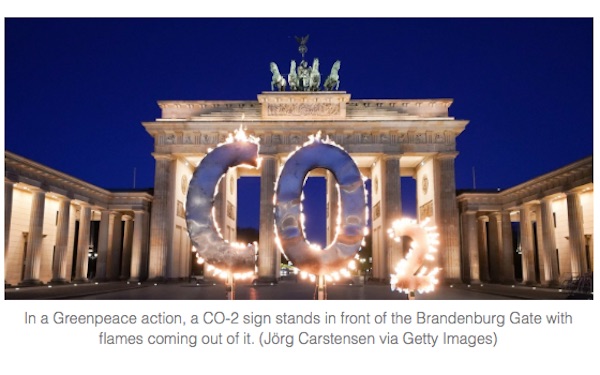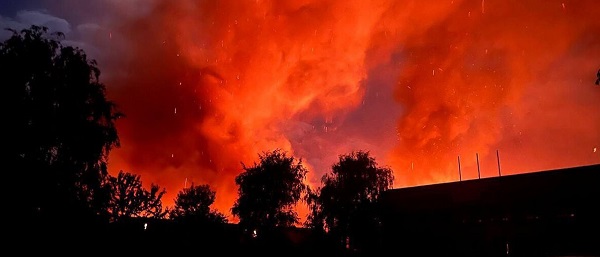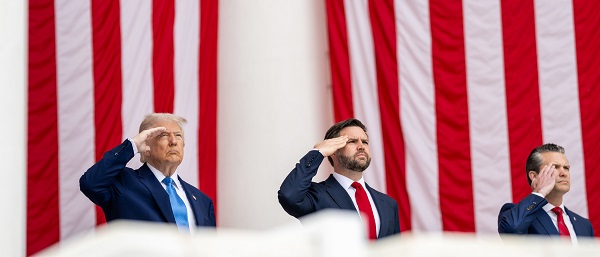conflict
The West’s Green Energy Delusions Empowered Putin

This article submitted by Michael Shellenberger
While we banned plastic straws, Russia drilled and doubled nuclear energy production.
How has Vladimir Putin—a man ruling a country with an economy smaller than that of Texas, with an average life expectancy 10 years lower than that of France—managed to launch an unprovoked full-scale assault on Ukraine?
There is a deep psychological, political and almost civilizational answer to that question: He wants Ukraine to be part of Russia more than the West wants it to be free. He is willing to risk tremendous loss of life and treasure to get it. There are serious limits to how much the U.S. and Europe are willing to do militarily. And Putin knows it.
Missing from that explanation, though, is a story about material reality and basic economics—two things that Putin seems to understand far better than his counterparts in the free world and especially in Europe.
Putin knows that Europe produces 3.6 million barrels of oil a day but uses 15 million barrels of oil a day. Putin knows that Europe produces 230 billion cubic meters of natural gas a year but uses 560 billion cubic meters. He knows that Europe uses 950 million tons of coal a year but produces half that.
The former KGB agent knows Russia produces 11 million barrels of oil per day but only uses 3.4 million. He knows Russia now produces over 700 billion cubic meters of gas a year but only uses around 400 billion. Russia mines 800 million tons of coal each year but uses 300.
That’s how Russia ends up supplying about 20 percent of Europe’s oil, 40 percent of its gas, and 20 percent of its coal.
The math is simple. A child could do it.
The reason Europe didn’t have a muscular deterrent threat to prevent Russian aggression—and in fact prevented the U.S. from getting allies to do more—is that it needs Putin’s oil and gas.
The question is why.
How is it possible that European countries, Germany especially, allowed themselves to become so dependent on an authoritarian country over the 30 years since the end of the Cold War?
Here’s how: These countries are in the grips of a delusional ideology that makes them incapable of understanding the hard realities of energy production. Green ideology insists we don’t need nuclear and that we don’t need fracking. It insists that it’s just a matter of will and money to switch to all-renewables—and fast. It insists that we need“degrowth” of the economy, and that we face looming human “extinction.” (I would know. I myself was once a true believer.)
John Kerry, the United States’ climate envoy, perfectly captured the myopia of this view when he said, in the days before the war, that the Russian invasion of Ukraine “could have a profound negative impact on the climate, obviously. You have a war, and obviously you’re going to have massive emissions consequences to the war. But equally importantly, you’re going to lose people’s focus.”
But it was the West’s focus on healing the planet with “soft energy” renewables, and moving away from natural gas and nuclear, that allowed Putin to gain a stranglehold over Europe’s energy supply.
As the West fell into a hypnotic trance about healing its relationship with nature, averting climate apocalypse and worshiping a teenager named Greta, Vladimir Putin made his moves.
While he expanded nuclear energy at home so Russia could export its precious oil and gas to Europe, Western governments spent their time and energy obsessing over “carbon footprints,” a term created by an advertising firm working for British Petroleum. They banned plastic straws because of a 9-year-old Canadian child’s science homework. They paid for hours of “climate anxiety” therapy.
While Putin expanded Russia’s oil production, expanded natural gas production, and then doubled nuclear energy production to allow more exports of its precious gas, Europe, led by Germany, shut down its nuclear power plants, closed gas fields, and refused to develop more through advanced methods like fracking.
The numbers tell the story best. In 2016, 30 percent of the natural gas consumed by the European Union came from Russia. In 2018, that figure jumped to 40 percent. By 2020, it was nearly 44 percent, and by early 2021, it was nearly 47 percent.
For all his fawning over Putin, Donald Trump, back in 2018, defied diplomatic protocol to call out Germany publicly for its dependence on Moscow. “Germany, as far as I’m concerned, is captive to Russia because it’s getting so much of its energy from Russia,” Trump said. This prompted Germany’s then-chancellor, Angela Merkel, who had been widely praised in polite circles for being the last serious leader in the West, to say that her country “can make our own policies and make our own decisions.”
The result has been the worst global energy crisis since 1973, driving prices for electricity and gasoline higher around the world. It is a crisis, fundamentally, of inadequate supply. But the scarcity is entirely manufactured.
Europeans—led by figures like Greta Thunberg and European Green Party leaders, and supported by Americans like John Kerry—believed that a healthy relationship with the Earth requires making energy scarce. By turning to renewables, they would show the world how to live without harming the planet. But this was a pipe dream. You can’t power a whole grid with solar and wind, because the sun and the wind are inconstant, and currently existing batteries aren’t even cheap enough to store large quantities of electricity overnight, much less across whole seasons.
In service to green ideology, they made the perfect the enemy of the good—and of Ukraine.
Take Germany.
Green campaigns have succeeded in destroying German energy independence—they call it Energiewende, or “energy turnaround”—by successfully selling policymakers on a peculiar version of environmentalism. It calls climate change a near-term apocalyptic threat to human survival while turning up its nose at the technologies that can help address climate change most and soonest: nuclear and natural gas.
At the turn of the millennium, Germany’s electricity was around 30 percent nuclear-powered. But Germany has been sacking its reliable, inexpensive nuclear plants. (Thunberg called nuclear power “extremely dangerous, expensive, and time-consuming” despite the UN’s International Panel on Climate Change deeming it necessary and every major scientific review deeming nuclear the safest way to make reliable power.)
By 2020, Germany had reduced its nuclear share from 30 percent to 11 percent. Then, on the last day of 2021, Germany shut down half of its remaining six nuclear reactors. The other three are slated for shutdown at the end of this year. (Compare this to nextdoor France, which fulfills 70 percent of its electricity needs with carbon-free nuclear plants.)
Germany has also spent lavishly on weather-dependent renewables—to the tune of $36 billion a year—mainly solar panels and industrial wind turbines. But those have their problems. Solar panels have to go somewhere, and a solar plant in Europe needs 400 to 800 times more land than natural gas or nuclear plants to make the same amount of power. Farmland has to be cut apart to host solar. And solar energy is getting cheaper these days mainly because Europe’s supply of solar panels is produced by slave labor in concentration camps as part of China’s genocide against Uighur Muslims.
The upshot here is that you can’t spend enough on climate initiatives to fix things if you ignore nuclear and gas. Between 2015 and 2025, Germany’s efforts to green its energy production will have cost $580 billion. Yet despite this enormous investment, German electricity still costs 50 percent more than nuclear-friendly France’s, and generating it produces eight times more carbon emissions per unit. Plus, Germany is getting over a third of its energy from Russia.
Germany has trapped itself. It could burn more coal and undermine its commitment to reducing carbon emissions. Or it could use more natural gas, which generates half the carbon emissions of coal, but at the cost of dependence on imported Russian gas. Berlin was faced with a choice between unleashing the wrath of Putin on neighboring countries or inviting the wrath of Greta Thunberg. They chose Putin.
Because of these policy choices, Vladimir Putin could turn off the gas flows to Germany, and quickly threaten Germans’ ability to cook or stay warm. He or his successor will hold this power for every foreseeable winter barring big changes. It’s as if you knew that hackers had stolen your banking details, but you won’t change your password.
This is why Germany successfully begged the incoming Biden administration not to oppose a contentious new gas pipeline from Russia called Nord Stream 2. This cut against the priorities of green-minded governance: On day one of Biden’s presidency, one of the new administration’’s first acts was to shut down the Keystone XL oil pipeline from Canada to the U.S. in service to climate ideology. But Russia’s pipeline was too important to get the same treatment given how dependent Germany is on Russian imports. (Once Russia invaded, Germany was finally dragged into nixing Nord Stream 2, for now.)
Naturally, when American sanctions on Russia’s biggest banks were finally announced in concert with European allies last week, they specificallyexempted energy products so Russia and Europe can keep doing that dirty business. A few voices called for what would really hit Russia where it hurts: cutting off energy imports. But what actually happened was that European energy utilities jumped to buy more contracts for the Russian oil and gas that flows through Ukraine. That’s because they have no other good options right now, after green activism’s attacks on nuclear and importing fracked gas from America. There’s no current plan for powering Europe that doesn’t involve buying from Putin.
We should take Russia’s invasion of Ukraine as a wake-up call. Standing up for Western civilization this time requires cheap, abundant, and reliable energy supplies produced at home or in allied nations. National security, economic growth, and sustainability requires greater reliance on nuclear and natural gas, and less on solar panels and wind turbines, which make electricity too expensive.
The first and most obvious thing that should be done is for President Biden to call on German Chancellor Scholz to restart the three nuclear reactors that Germany closed in December. A key step in the right direction came on Sunday when Vice-Chancellor Robert Habeck, the economy and climate minister, announced that Germany would at least consider stopping its phaseout of nuclear. If Germany turns these three on and cancels plans to turn off the three others, those six should produce enough electricity to replace 11 billion cubic meters of natural gas per year—an eighth of Germany’s current needs…
Subscribe to Michael Shellenberger to read the rest.
Become a paying subscriber of Michael Shellenberger to get access to this post and other subscriber-only content.
Artificial Intelligence
AI Drone ‘Swarms’ Unleashed On Ukraine Battlefields, Marking New Era Of Warfare


From the Daily Caller News Foundation
Artificial intelligence-powered drones are making their first appearances on the battlefield in the Russia-Ukraine war as warfare creeps closer to full automation.
In bombardments on Russian targets in the past year, Ukrainian drones acting in concert were able to independently determine where to strike without human input.
It’s the first battlefield use of AI “swarm” technology in a real-world environment, a senior Ukrainian official and Swarmer, the company who makes the software, told the Wall Street Journal in a Tuesday report. While drones have increasingly defined modern battlefields, swarms until now had been confined to testing rather than combat.
“You set the target and the drones do the rest,” Swarmer Chief Executive Serhii Kupriienko told the WSJ. “They work together, they adapt.”
So far, the Swarmer technology has been used hundreds of times to target Russia assets, but was first used a year ago to lay mines on the front, the Ukrainian official told the WSJ. The software has been tested with up to 25 drones at once, but is usually utilized with only three.
Kupriienko told the WSJ that he was preparing to test up to 100 drones at once with the linking software.
A common arrangement used on the battlefield includes one reconnaissance drone to scout out the target and two explosive drones delivering the payload on target, the official told the WSJ.
While Western nations such as the U.S., France and the United Kingdom are also pursuing drone swarm technology, they have not deployed swarm technology on the battlefield the way Ukraine has, according to the WSJ. Currently, autonomous weapons are not regulated by any international authority or binding agreement, but ethical concerns around the technology has led many to call for increased regulation of weapons like the Swarmer system.
The Ukrainian Ministry of Foreign Affairs did not immediately respond to the Daily Caller News Foundation’s request for comment.
conflict
Trump Pentagon Reportedly Blocking Ukraine From Firing Western Missiles Deep Into Russia


From the Daily Caller News Foundation
The Department of Defense has spent months blocking the Ukrainian military from using American and British-made missiles to hit targets deep inside Russia, The Wall Street Journal reported Sunday, citing unnamed U.S. officials.
Undersecretary of Defense for Policy Eldridge Colby reportedly designed the procedure to review requests to carry out the long-range strikes with weapons that are either of U.S. origin or that require American intelligence or use components provided by the U.S., according to the WSJ. Secretary of Defense Pete Hegseth reportedly has the final say on whether Ukrainian forces can use the MGM-140 ATACMS (Army Tactical Missile System) to hit targets in Russia.
The reported blocks on missile strikes coincides with a Trump administration effort to broker a peace deal between Russia and Ukraine. A Pentagon spokesperson declined to comment further on the matter.
BREAKING: President Vladimir Putin reacts to B-2 Flyover pic.twitter.com/1mzVn7DxlW
— Jack Poso 🇺🇸 (@JackPosobiec) August 15, 2025
The Biden administration allowed Ukraine to carry out strikes with ATACMS in November, weeks after President Donald Trump won the 2024 election, the New York Times reported. Trump criticized the move during a December interview with Time magazine.
“It’s crazy what’s taking place. It’s crazy,” Trump said. “I disagree very vehemently with sending missiles hundreds of miles into Russia. Why are we doing that? We’re just escalating this war and making it worse. That should not have been allowed to be done.”
Trump and Russian President Vladimir Putin met in Alaska on Aug. 15 for a summit meeting during which Trump sought to secure a cease-fire in Russia’s war with Ukraine. As Trump greeted Putin, a B-2A Spirit stealth bomber and several fighters carried out a flyover of Elmendorf Air Force Base.
Trump met with Ukrainian President Volodymyr Zelensky and major European leaders on Aug. 18 to update them on the summit.
In July, Trump reached an agreement with NATO where members of the alliance would purchase weapons, including MIM-104 Patriot surface-to-air missiles, and donate them to Ukraine.
-

 Health1 day ago
Health1 day agoTens of thousands are dying on waiting lists following decades of media reluctance to debate healthcare
-

 Opinion1 day ago
Opinion1 day agoLandmark 2025 Study Says Near-Death Experiences Can’t Be Explained Away
-

 Alberta5 hours ago
Alberta5 hours agoPremier Smith explains how private clinics will be introduced in Alberta
-

 Carbon Tax2 days ago
Carbon Tax2 days agoCarney fails to undo Trudeau’s devastating energy policies
-

 International2 days ago
International2 days agoCanada’s lost decade in foreign policy
-

 Business1 day ago
Business1 day agoBudget 2025: Ottawa Fakes a Pivot and Still Spends Like Trudeau
-

 armed forces2 days ago
armed forces2 days agoCanada At Risk Of Losing Control Of Its Northern Territories
-

 Business4 hours ago
Business4 hours agoUS Supreme Court may end ‘emergency’ tariffs, but that won’t stop the President




